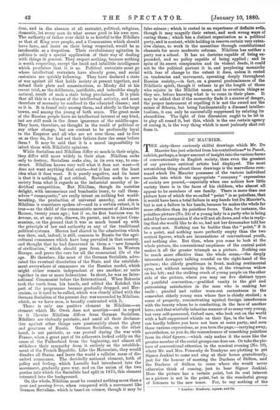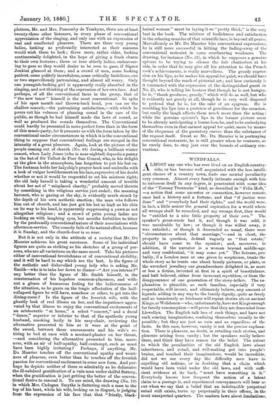DU MAITRIER. T HE sixty-three curiously skilful drawings which Mr. Du
Manner has just selected from his contributions* to Punch, exhibit, perhaps, a larger amount of insight into the various forms of conventionality in English society, than even the greatest of our previous satirical artists had displayed. The most astonishing thing about these drawings is the marvellous com- mand which Du Manner possesses of the various individual moulds into which the appropriate " company " expressions of society are poured,—especially when one notices how little variety there is in the faces of his children, who almost all appear to be members of one family. There is more than one picture here of which the so-called " point " is so pointless, that it would have been a total failure in any hands but Du Manner's, but is not a failure in his hands, because he makes the whole far more effective than its pointless focus. Take, for instance, the pointless picture (No. 24) of a young lady in a party who is being asked by her companion if she will not sit down, and who is reply- ing that she would like to do so, had not her dressmaker told her she must not. Nothing can be feebler than the "point," if it be a point, and nothing more perfectly empty than the two central figures, which are incarnations of conventional youth, and nothing else. But then, when you come to look at the whole picture, the conventional emptiness of the central point makes it all the greater triumph as a picture. Nothing can be much more effective than the whole scene,—the deeply interested dowagers talking scandal on the right-hand of the picture; the elderly gentleman in front, making sentimental eyes, not without meaning in them, at the vivacious widow on his loft; and the striking crush of young people on the other side of the picture, where you may see five distinct types of youthful convention,—gratified vanity in the girl and patronising satisfaction in the man who is making her smile ; puzzled and rather worn-out earnestness in the somewhat elderly young man whose face is chiefly studied; a sense of property, remonstrating against foreign interference with the beauty whom he is conducting, in the face of another hero; and that wistfully infantine manner of so many very young, but very self-possessed, Oxford men, who look out on the world with a half-suppressed whistle on their lips, in the last. You can hardly believe you have not been at some party, and seen these various expressions, as you turn the page,—carrying away, nevertheless, as you do, the remembrance of something pointless from its chief figures,—which only makes it the more like the greater number of the social groups one does see. Or take the pic- ture of conventional attention in the musical evening (No. 19), where Mr. and Mrs. Ponsonby de Tomkyns are plotting to get Signor Jenkini to come and sing at their house gratuitously, just for the honour of meeting the Duchess of Stilton, and the Duchess of Stilton to come where she would never otherwise think of coming, just to hear Signor jenkini. Here the picture has a certain point, but its real interest as a picture is not in the point, but in the wonderful group of listeners to the new tenor. For, to say nothing of the
• London: Bradbury, Agnew, and CO.
plotters, Mr. and Mrs. Ponsonby de Tomkyns, there are at least twenty-three other listeners, in every phase of conventional appreciation of the singing, and only one with an expression of real and unaffected pleasure. There are three very young ladies, looking as profoundly interested as their mamma would. wish them to look ; three more, rather older, looking sentimentally delighted, in the hope of giving a fresh charm to their own features ; three or four elderly ladies, endeavour- ing to gaze as they would desire to be seen to gaze, if Signor Jenkini glanced at them; and a crowd of men, some looking patient, some politely incredulous, some critically fastidious, one or two superciliously patronising, and almost all weary. Only one youngish-looking girl is apparently really absorbed in the singing, and not thinking of the expression of her own face. And perhaps., of all the conventional faces in the group, that of "the new tenor" himself is the most conventional. In spite of his open month and thrown-back head, you can see the shallow conceit,—the patronising satisfaction,—with which he pours out his volumes of pleasing sound in the ears of the public, as though he had himself made the laws of sound, as well as produced the sounds themselves. The Conventional could hardly be presented in more perfect form than in the form of this music-party, for it presents us with the form taken by the conventional under circumstances in which it is the conventional thing to suppose that conventional feelings are merged in the intensity of a great pleasure. Again, look at the picture of the people coming out of church (No. 44) during a brilliant winter sunset, when Lady Jones (who is near-sighted) deposits a penny in the hat of Sir Talbot de Poer San Grazul, who, in his delight at the glow in the atmosphere, has forgotten to put his hat on. The footman holds her ladyship's prayer-book and umbrella with a look of vulgar bewilderment on his face, expressive of his doubt whether or not it would be respectful to set his mistress right; the old lady herself is taking a wonderful amount of trouble about her act of "misplaced charity," probably moved thereto by something in the religious service just ended; the mooning baronet, who is gazing at the sky, is evidently much struck by the depth of his own msthetic emotion; the man who follows him out of church, and has just got his hat as high as his chin on its way to his head, is apparently suppressing a yawn as not altogether religious ; and a crowd of prim young ladies are looking on with laughing eyes, but mouths forbidden to titter by the profoundly conventional nature of their associations with afternoon-service. The comedy fails of its natural effect, because it is Sunday, and the church-door is so near.
But it is not only in the attitude of a society that Mr. Du Manner achieves his great successes. Some of his individual figures are quite as striking as his sketches of a group of per- sons, who are all variations on the same mood. Take his pictures either of conventional feverishness or of conventional stolidity, and it will be hard to say which are the best. Is the figure of the aesthetic and dishevelled young lady who is asking Mr. Smith—who is to take her down to dinner—" Are you intense P" any better than the figure of Mr. Smith himself, in the consternation of his hopeless common-placeness, and with- out a gleam of humorous feeling for the ludicrousness of the situation, as he gazes on the tragic affectation of the half- collapsed figure he will have, somehow or other, to get into the dining-room? Is the figure of the feverish wife, with the ghastly look of real illness on her, and the impatience aggra- vated by that illness to enjoy the conventional excitements of an aristocratic "at home," a select "concert," and a ducal "dance," superior or inferior to that of the apathetic young husband, smoking lazily in his easy-chair, reviewing the alternative presented to him as it were at the point of the sword, between these amusements and his wife's re- tiring to bed at once with a mustard-plaster on her throat, —and considering the alternative presented to him, more- over, with an air of half-apathy, half-contempt, such as must have been highly irritating? Perhaps, if anything, Mr. Du Manlier touches off the conventional apathy and weari- ness of pleasure, even better than he touches off the feverish passion for conventional excitement in some new form. And per- haps he depicts neither of these so admirably as he delineates the ill-subdued gratification of a vain man under skilful flattery, when the gratification is just getting the better of the conven- tional desire to conceal it. To our mind, the drawing (No. 10) in which Mrs. Cadogan Smythe is flattering such a man to the top of his bent, while his wife, looking on in disgust, is judging from the expression of his face that that "frizzly, black- haired woman" must be laying it on "pretty thick," is the very best in the book. The mixture of foolishness and satisfaction in the relaxing muscles of that scientific face, is beyond all praise. Marvellously as Mr. Du Manlier hits conventional expressions, he is still more successful in hitting the fading-away of the conventional restraint in some overbearing weakness. The drawing, for instance (No. 21), in which he supposes a genuine epicure to be trying to silence the fair chatterbox at his side, in order that he may give all his attention to the French cook's achievements, is really marvellous. The greedy expres- sion on his lips, as he makes his appeal for quiet, we should have thought beyond the reach of pictorial art ; and how curiously is it contrasted with the expression of the distinguished guest in No. 25, who is telling his hostess that though he is not hungry, he is, "thank goodness, greedy," which will do as well, but who is evidently not greedy at all, though he is very well disposed to pretend that he is, for the sake of an epigram. He is moulding his lips into a pretence of greediness for the occasion, but really the laugh affects them much more than the acting ; while the genuine epicure's lips in the former picture seem to be already anticipating a bonne-bouche, and to be embodying themselves even in that earnest appeal for quiet, more by means of the eloquence of the gustatory curves than the substance of the request itself. Great as Mr. Da Maurier is in portraying conventional restraints, he is still greater when he ventures, as he rarely does, to step just over the bounds of ordinary con- ventions.



































 Previous page
Previous page